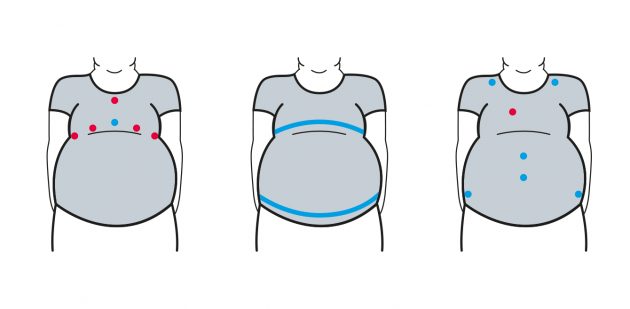Swiss engineers have designed clothing used to monitor the consequences of excess weight. The T-shirt is equipped with a number of sensors, including an electrocardiogram.

“Metabolic syndrome”, the medical term used to describe the harmful effects of excess weight, is a condition affecting nearly 40% of Swiss people. Overweight people face a higher risk of cardiovascular incidents and sleep apnea. Concern over obesity is growing in the medical community. One of the most original solutions proposed to remedy the situation is unquestionably the ObeSense project, led by the Swiss Centre for Electronics and Microengineering (Centre Suisse d’Electronique et de Microtechnique or CSEM) in Neuchâtel. It is designing “intelligent” garments to anticipate these types of complications.
“We have already developed systems featuring sensor-equipped T-shirts which can be used to assess physical performance or a patient’s state of health,” says Mattia Bertschi, section director of the CSEM. “But this new medical application will require more data to establish a diagnosis.”
The research centre is working with other laboratories throughout the country, including the Lausanne University Hospital (CHUV), Swiss Federal Institute of Technology in Lausanne (EPFL), University Hospital Zurich (UZH) and the Swiss Rehabilitation Centre (Centre romand de rééducation or CRR). Each establishment focuses on developing a specific application for this high-tech clothing. The CSEM is responsible for the physical activity indicator, determined with an accelerometer, and cardiac performance using an electrocardiogram embedded in the T-shirt. The UZH calculates cardiac output by the oxygen concentration in skin capillaries, while the CRR measures energy consumption based on lung ventilation. “By combining all these parameters, we can develop a more detailed analysis of our observations and more effectively prescribe an appropriate treatment for obese people,” says Etienne Pruvot, a doctor at the Cardiology Service at the CHUV.
"Our goal is to transfer our innovations to Swiss industry."
Initial testing
This “smart textile” is not only used to prevent the risks of obesity but is also a relatively non-invasive way of monitoring patients. “The traditional methods of measuring calories generally require the use of a face mask or take place in a special room. The T-shirt would make certain costly laboratory analyses obsolete,” says Olivier
Dériaz, doctor and research director at the CRR. This innovative solution would also simultaneously record a range of indicators, saving healthcare workers a considerable amount of time.
A simplified prototype has already been tested on 15 volunteers in Valais, Switzerland. “We first experimented with it on healthy people with different body masses, including some slightly overweight individuals,” he says. The findings are currently being analysed at the EPFL and will be available within the next few months.
And for seniors too
The T-shirt has proved its success and is gaining popularity, but it could also revolutionise how general practitioners work. “Our goal is to transfer our innovations to Swiss industry,” says Mattia Bertschi. “But before a product can be launched on the market, the initial results must be validated and clinical trials conducted once approval is granted by the competent authorities.”
If these steps are completed, this intelligent garment could be extended to other applications. “It would be the ideal tool for monitoring older patients. The clothing could be hooked up to a smartphone and send an alert if no activity is detected,” says Etienne Pruvot. The cardiologist is already envisaging an expertise centre to handle “alert” data and determine whether emergency intervention is needed or whether the attending physician should simply be notified.
Above:
The “intelligent T-shirt” developed by the Swiss Centre for Electronics and Microengineering contains an electrocardiogram and an accelerometer. The data it records includes cardiac and energy consumption.